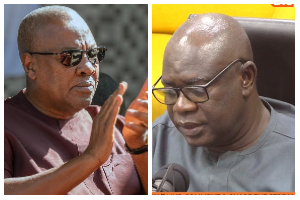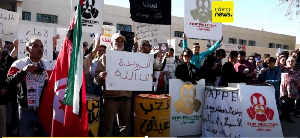Alex Bossman Baafi
The New Patriotic Party (NPP) lost power to the ruling National Democratic Congress (NDC) during the last general elections almost in 2008. The NPP Administration left office with a high deficit of almost 15% of the country’s Gross Domestic Products (GDP) and end of year inflation of 18.1% as well as GDP growth rate of 7.3%. The NDC saw this as unimpressive record but arguably, it happened at the time of one of the world’s worse external shocks of the global financial crisis and astronomical world market price of oil which threatened to collapse virtually all economies in the world. Why the NPP Administration tried to prove the point that judging from the gravity of the external shocks and the circumstances of the global economic order at the time its government had done well, the NDC government that had just taken over begged to differ. To them, the previous administration was just irresponsible and reckless for leaving the economy in shambles as it were. As part of the strategy, the NDC government made the very end of the previous government the triumph card and whipped up the support of the good people of this country, highlighting the deficit, outstanding debt at Tema Oil Refinery (TOR), debt owed various contractors to show how the previous administration was insensitive to the plight of the good people of this country.
Despite the hopelessness of the situation as portrayed by the NDC government, many shared the view that all was not hopeless and that there were certain laudable legacies of the NPP Administration which are still vividly fresh in the minds of the good people of this country. Some of the notable legacies included the institution of the National Health Insurance Scheme (NHIS), National Youth Employment Programme (NYEP), Metro Mass Transit (MMT), The School Feeding Programme and many more. At the GDP growth rate of 7.3%, inflation of 18.1% and a deficit of 15% at the end of 2008, in the face of the external shocks that plagued the country as explained earlier, the NPP government pursued stability and growth macroeconomic policy that lubricated the economy by creating the necessary enabling environment for businesses. The administration also worked hard to discover Oil and Gas in commercial quantities, sourced for funding for the construction of Bui Dam and City, a legacy in my opinion that qualifies as one of indelible mark to be left by any serious government of our dear country. Investment in the roads infrastructure was not left out including development projects in the health, education, Agriculture, sports, defense and other sectors of the economy. Others included the conception and preparations of the pension reform and Single Spine Salary Structure for implementation all of which had been hailed by the workforce of this country.
Politics of the developing world most of the time is full of lies and propaganda. It tends to centre on personalities instead of issues and so was the case of the 2008 elections. The focus was on the unpleasant issues and that all the remarkable achievements and initiatives of the NPP were competently rubbished by the NDC government on assuming office having promised better alternatives that will lead to a Better Ghana. Having raised the bar and wetting the appetite of the electorate with catchy and ambitious promises to secure their mandate, it is the delivery that has become a challenge because talk is always cheap. One may argue that “it is the end that justifies the means” and that the NDC government has been given a 4-year mandate and therefore it is naturally unfair to cry doom just within almost 2 years down the lane. That is fair enough but in my humble opinion, governance is a momentum game and therefore it is critical to get it right in the early few months or years in office. This is because the government’s decisions and actions end up having a great impact on everything that follows. We must bear in mind that opposition everywhere strain to discern intent in order to assess credibility. It seems to me that the Mills – Mahamma government assumed office without a vision and a programme. So far, this government has failed to articulate a clear vision and direction and as a result, it lacks the foundation upon which to achieve the vision. Selecting a competent team for example is critical part of the foundation to achieve a vision. Lack of these had made delivery in certain sectors of the economy very difficult giving room for blame games and speculations here and there. The upsurge of foot-soldierism dotted round the country for lack jobs, the irresponsible attacks on the country’s Judiciary, confusion in the government’s communication machinery, the founder of the ruling party’s severe criticism of the government are really testimonies of the point I am trying to put across.
In deed, the NDC government is becoming less attractive because there has not been any paradigm shift or drastic departure from the government style of the previous administration as promised by this NDC government. The government is struggling to reshape the Kuffour initiatives and take credit but it is not washing because many are fast deteriorating under the current government. For example, the NHIS is simply collapsing not to mention the free maternal care initiative that was inherited by the current administration from the previous one. The good people of this country are really looking for improvements on those initiatives and perhaps more new ones from this social democratic government.
The NDC is losing the 2012 battle because one area where this government was expected to leave life worthy of emulation was its anti-corruption campaign carefully waged against the NPP Administration when in office. The people of this government have shown that they are those who set standards of behaviour when in opposition and violate them with impunity when in power. Massive corruption was used to bring down the NPP regime including the Ghana @ 50 celebrations but today, corruption has become incarnate because corruption is seen everywhere with this NDC administration against the backdrop promise of the president not to shield anybody who associates with corrupt practices in his government. The Carl Wilson’s criminal and corrupt practices as well as the STX – government-housing deals are all tips of the iceberg making some of us losing confidence of integrity and credibility in this government. Also, this Mills government has so far failed to walk the talk by honouring most promises to the electorate including its foot soldiers. Some of the promises the good people of this country are waiting for are drastic fuel prices reduction, investing in people including creating more jobs and thereby putting money in people’s pocket and improving the health care delivery by introducing the one time premium payment for the NHIS. It appears the government has cultivated the habit of lies and propaganda again such as it has created 1.6 million jobs and constructed 1,000 schools to replace schools under trees, which have all appeared to be hoax.
On the economy, the record of this Mills – Mahamma led government gives mixed feelings. Nobody can deny the fact that the government has worked hard to stabilize the economy. Inflation had been consistently reduced from around 20% at the beginning of 2009 to 9.52% as at the end of June 2010. The exchange rates are stable; the prime rate is now 13.5% culminating in the commercial banks lowering their interest rates ranging from 22% to 28%. These are very remarkable achievements. However, the effects of these on the macroeconomic environment are not enough because at the same time certain government decisions and policy initiatives run counterproductive, negating the enhancement of economic growth and development. The government had decided to cut spending in line with International Monetary Fund (IMF) directive. In addition, the government had resorted to the use of excessive taxation as part of the stabilization drive. For example, taxes on importation of rice and poultry products had gone up over 500%, taxes on fruits and alcoholic beverages went up by 20%, fuel 45%, Roads and Bridges Tolls averaging 1,500%, electricity and water averaging 89% and 46% respectively not to mention the rise in import duties of our ports. These have drastically reduced consumer confidence, peoples’ purchasing power had gone down considerably reducing the total aggregate demand of the economy, hence, growth had become scanty or stagnant as we are experiencing in the country today.
In terms of decisions, one area where this government is a shame is the management of the Tema Oil Refinery (TOR) and the fuel supplies to this country. As I am writing, there is widespread shortage of LPG Gas in most parts of the country. This has happened innumerable times since the NDC government took office. The situation has adversely affected many small scale domestic, hospitality and commercial transportation businesses. Such irresponsible attitude of any government would not auger well for any economy anywhere in the world. So yes inflation is going down, the banking community still faces enormous risks to advance credit because consumer confidence has dropped sharply as result of lack of an enabling environment.
Just recently, the minister of Roads and Highways was seen on the Television News lamenting that importation by our neighboring landlocked countries through our Tema and Takoradi ports had reduced by 46% and 34% respectively due the country’s strict adherence to the implementation of the ECOWAS Axle-Load policy and that many importers are relocating. Instead of taking action on such a serious revenue loss to the state, he was just appealing to the ECOWAS Authorities to ensure that the neighboring countries observe the axle-load policy. What full-scale investigation has he initiated to find out the immediate and remote causes to the drastic reduction in revenue to the state? Such is the lazy and irresponsible attitude of state officials who are well taken care of by the taxpayers. Yes I do agree with him the axle-load policy is part of the problem. Other contributing factors could be corruption including the reckless and criminal activities of Carl Wilson backed by certain Greedy Bastards at the office of the president. Forceful confiscation of legally and lawful importation of cars through our ports without conscience and sold cheaply to NDC cronies incurred the wrath and displeasure of many importers and hence the relocating. The point is that had the government not condoned and approved corruption by sweeping Carl Wilson’s action under the carpet with a mere sack, investigation and prosecution could have bought to the fore these serious loss of revenue to the state.
I am not a prophet of doom but I could see that factionalism that has engulfed the ruling NDC party if not checked will make the party lose the 2012 crucial battle. The spokesperson of the former president Jerry John Rawlings, Kofi Adams, has been bold to admit that there are Rawlings’ factions as against Mills’ factions. In my opinion, the relationship within these groups is not healthy. If the elders of the party continue to look on adamant, it could send the NDC government parking and subsequently heading towards its imminent grave.
To salvage the situation, the president and the NDC party should work together, take bold decisions and initiate new development programmes to create jobs, eschew corruption, put proper foundation in place to achieve a clearly spelt out Better Ghana Agenda, refrain from lies and propaganda otherwise it will be easier for a camel to go through the eye of a needle than for the NDC to pass the test of 2012 battle with this current record in office.
Email: abkbossman@yahoo.co.uk
Opinions of Wednesday, 1 September 2010
Columnist: Baafi, Alex Bossman














